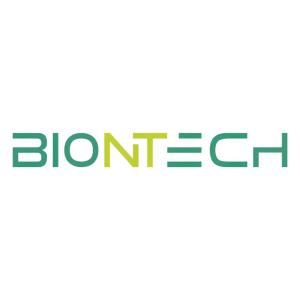Duality Biologics and BioNTech Presented Positive Interim Data for Investigational B7-H3 Antibody-Drug Conjugate BNT324/DB-1311 in Advanced Solid Tumors at the ESMO Asia Congress 2024
Rhea-AI Summary
BioNTech (BNTX) and DualityBio presented promising Phase 1/2a trial results for BNT324/DB-1311, a B7-H3 targeting antibody-drug conjugate, at ESMO Asia 2024. The trial included 277 patients with advanced solid tumors, showing encouraging antitumor activity and manageable safety. Key findings include:
- 70.4% unconfirmed objective response rate in SCLC patients with prior immunotherapy at 9 mg/kg dose
- 28.0% response rate in CRPC patients with 7.2 months median rPFS
- Overall response rate of 32.4% across all evaluable patients
- Common side effects included nausea and decreased blood cell counts
The companies plan to start a Phase 1/2 combination trial with BNT327/PM8002 in SCLC/NSCLC patients in 2025.
Positive
- High response rate of 70.4% in SCLC patients at 9 mg/kg dose level
- Overall response rate of 32.4% across all evaluable patients
- Disease control rate of 82.4% in evaluable patients
- Promising 94.7% 6-month rPFS rate in CRPC patients
- Manageable safety profile across all evaluated patients
Negative
- Lower response rates in NSCLC patients (22.0% non-squamous, 16.0% squamous)
- 61% of trial participants required two or more lines of therapy, indicating heavily pretreated population
News Market Reaction – BNTX
On the day this news was published, BNTX gained 2.42%, reflecting a moderate positive market reaction.
Data tracked by StockTitan Argus on the day of publication.
- BNT324/DB-1311 showed encouraging antitumor activity and a manageable safety profile in a Phase 1/2a clinical trial in heavily pretreated patients with locally advanced or metastatic solid tumors, including small cell lung cancer ("SCLC"), non-small cell lung cancer ("NSCLC"), and castration-resistant prostate cancer ("CRPC").
- In patients with SCLC with at least one post-baseline tumor assessment and who had received prior immunotherapy but no prior topoisomerase 1 inhibitor, the unconfirmed objective response rate ("uORR") was
70.4% at the BNT324/DB-1311 9 mg/kg dose level. - In patients with CRPC, the uORR was
28.0% ; imaging progression-free survival ("rPFS") data are not yet mature, with a median rPFS of 7.2 months and a 6-month rPFS rate of94.7% . - Multiple clinical trials combining selected assets from BioNTech's and DualityBio's strategic partnership with BNT327/PM8002, an investigational bispecific antibody targeting PD-L1 and VEGF-A, are planned; a Phase 1/2 trial evaluating BNT324/DB-1311 with BNT327/PM8002 in patients with SCLC or NSCLC is planned to start in 2025.
The analysis of the ongoing Phase 1/2a trial included 277 participants across various solid tumor types including small cell lung cancer ("SCLC"), non-small cell lung cancer ("NSCLC"), castration-resistant prostate cancer ("CRPC"), and squamous cell carcinoma of the head and neck ("SCCHN"). About
- Among all evaluable patients with at least one post-baseline tumor assessment (n=238), the overall uORR was
32.4% , and the DCR was82.4% . - Among patients with SCLC (n=73), the uORR was
56.2% , and the DCR was89.0% . The majority of patients with SCLC received 6 mg/kg and 9 mg/kg of BNT324/DB-1311, with no difference in uORR between the two dose groups (54.5% and58.8% , respectively). Notably, at the 9 mg/kg dose level, the uORR in patients with SCLC who had prior immunotherapy but no treatment with topoisomerase I inhibitors reached70.4% . - Most patients with NSCLC had non-squamous histology (n=41), exhibiting an uORR of
22.0% , while patients with squamous NSCLC (n=25) had an uORR of16.0% . - Among patients with CRPC (n=32), BNT324/DB-1311 demonstrated early antitumor activity with an uORR of
28.0% and a DCR of92.0% . With a median rPFS of 7.2 months, the rPFS data were not mature at the time of the analysis. The 6-month rPFS rate was94.7% . - In other tumor types, including cervical cancer (n=4), hepatocellular carcinoma (n=12), head and neck squamous carcinoma (n=3), and melanoma (n=11), BNT324/DB-1311 also exhibited antitumor activity with uORRs of
75.0% ,25.0% ,100.0% , and36.4% , respectively. - BNT324/DB-1311 showed a manageable safety profile across all evaluated patients and tumor types (n=277). The most common treatment-related adverse events (TRAEs) reported included nausea, neutrophil count decreased, anemia, white blood cell count decreased, decreased appetite, and platelet count decreased.
Dr. John Zhu, Founder and CEO of Duality Biologics, said, "BNT324/DB-1311 is an innovative ADC molecule co-developed by BioNTech and DualityBio, showing clinical data in the study phase. This early data supports DualityBio's ADC technology platform, and the continued research and development of novel ADC therapies with the aim to improve the standard of care, and embodying DualityBio's commitment to exploring innovative treatments while advancing the global ADC industry for patient benefit."
BNT324/DB-1311 is one of three clinical stage ADC candidates in BioNTech's and DualityBio's global strategic partnership aimed at advancing these novel ADC assets into late-stage development in multiple high unmet medical need cancer indications. Multiple clinical trials combining selected assets from BioNTech's and DualityBio's strategic partnership with BNT327/PM8002, a novel investigational bispecific antibody targeting PD-L1 and VEGF-A, which is being jointly developed by BioNTech and Biotheus are planned in various solid tumor indications. A Phase 1/2 clinical trial evaluating the combination of BNT325/DB-1305, a TROP2 targeting ADC candidate, and BNT327/PM8002 is currently ongoing. A Phase 1/2 trial evaluating BNT324/DB-1311 in combination with BNT327/PM8002 in patients with SCLC or NSCLC is planned to start in 2025.
About BNT324/DB-1311
BNT324/DB-1311 is a next-generation topoisomerase-I-inhibitor-based ADC candidate targeting the immune checkpoint protein B7-H3. The transmembrane glycoprotein B7-H3 plays a critical role in the anti-tumor immune response and the shaping of the tumor microenvironment. It is overexpressed in a range of solid tumors, with limited expression in healthy tissues, and has been associated with disease progression and very poor prognosis.[i] Preclinical studies have shown that BNT324/DB-1311 exhibits antitumor activity in various solid tumor models.[ii] Preliminary data from the ongoing Phase 1/2a trial (NCT05914116) has demonstrated antitumor activity and a manageable safety profile for BNT324/DB-1311 in patients with advanced solid tumors.
In June 2024, the
About Duality Biologics
Duality Biologics ("DualityBio") is a clinical-stage biotech company focusing on the discovery and development of next-generation antibody-drug conjugate (ADC) therapeutics to treat cancer, autoimmune diseases, and beyond. DualityBio has successfully built several cutting-edge ADC technology platforms with global intellectual property rights. Based on deep understanding of diseases, DualityBio has built a robust pipeline of ADCs, including several candidates in clinical stage. DualityBio has seven ongoing global multi-regional clinical trials (MRCTs) across 17 countries with over 1,000 patients enrolled. In addition, DualityBio is leveraging its novel protein engineering and unique ADC technologies to develop the next generation of "Super ADCs", such as bispecific ADCs, ADCs with novel MOA payload and antibody-immune modulator-conjugates.
[i] Ranjana K. Kanchan, et al. Biochim Biophys Acta Rev Cancer. 2022 Sep;1877(5):188783. |
[ii] Li C, Yao J, et al. Cancer Res (2023) 83 (7_Supplement): 2967. |
![]() View original content to download multimedia:https://www.prnewswire.com/news-releases/duality-biologics-and-biontech-presented-positive-interim-data-for-investigational-b7-h3-antibody-drug-conjugate-bnt324db-1311-in-advanced-solid-tumors-at-the-esmo-asia-congress-2024-302324504.html
View original content to download multimedia:https://www.prnewswire.com/news-releases/duality-biologics-and-biontech-presented-positive-interim-data-for-investigational-b7-h3-antibody-drug-conjugate-bnt324db-1311-in-advanced-solid-tumors-at-the-esmo-asia-congress-2024-302324504.html
SOURCE Duality Biologics








